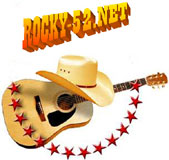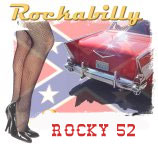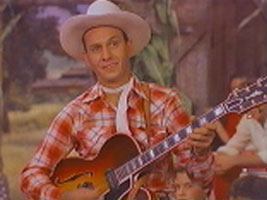


|
|
|
 |
|
|
|

![]() Guitariste Country US né William Lewis Byrd, le 17
Février 1920 à Williamson County
(Tennessee). Billy Byrd est décédé le 7 Août 2001 à Nashville (Tennessee).
Guitariste Country US né William Lewis Byrd, le 17
Février 1920 à Williamson County
(Tennessee). Billy Byrd est décédé le 7 Août 2001 à Nashville (Tennessee).
![]() Billy Byrd
was among the first musicians to make the electric guitar "sing" in a country
voice, and make the public love it. He was also one of the first country players
to make a name for himself with the electric guitar. He was also that rarity in
country music, a bandmember who was allowed to "co-star" alongside the singer
for whom he was working. As lead guitarist in
Ernest Tubb's band from the end of 1949 until 1959, his playing was among
the most widely heard in country music, and
Tubb always made a point of featuring Byrd prominently in his stage act and
on his records, and introducing him by name wherever possible.
Billy Byrd
was among the first musicians to make the electric guitar "sing" in a country
voice, and make the public love it. He was also one of the first country players
to make a name for himself with the electric guitar. He was also that rarity in
country music, a bandmember who was allowed to "co-star" alongside the singer
for whom he was working. As lead guitarist in
Ernest Tubb's band from the end of 1949 until 1959, his playing was among
the most widely heard in country music, and
Tubb always made a point of featuring Byrd prominently in his stage act and
on his records, and introducing him by name wherever possible.
William Lewis Byrd was born in Nashville. Whatever the city's musical
inclinations, however, his family didn't want to see him become a country
musician. A guitarist from age ten on, he displayed an impressive level of skill
and technique, and his parents hoped he would pursue a career in classical
music. He began playing with his older brother James, and made his radio debut
on WLAC in Nashville in 1935. At age 18, he was hired as a backup musician on
the Grand Ole Opry, and began working that same year with the Tennessee Valley
Boys. Toward the end of the 1930s, he also worked in various dance bands in the
Nashville area.
Byrd served in the U.S. Navy as a cook on a destroyer escort. He resumed his
career in Nashville after the war, initially as a member of
Wally Fowler & His Georgia Clodhoppers,
where he remained until 1948. That year he went to Louisiana, joining the
Louisiana Hayride and playing with Curly Williams & the Georgia Peach Pickers.
During the fall of 1949, Byrd joined Ernest
Tubb's Texas Troubadours, succeeding Tommy "Butterball" Page as lead
guitarist on the single "Tennessee Border No. 2." It was as a member of the
Texas Troubadours that Byrd became a star,
Tubb mentioning Byrd by name ahead of each solo, and his solos were among
the prettiest, most fluid, and memorable in country music. Byrd appeared on
hundreds of songs, among them "Two Glasses Joe," "Jealous Loving Heart," "Answer
the Phone," and "Letters Have No Arms," from 1949 until 1959, and was also
prominently featured as part of Tubb's
appearances on the Grand Ole Opry and other television shows. His playing made
the electric guitar a popular instrument among country audiences, and in 1950 he
collaborated with Hank Garland in
the design of the Byrdland guitar for Gibson. While in
Tubb's band, he played a customized
instrument that included the name "Billy Byrd" prominently embossed on the neck.
Byrd also played a considerable number of sessions with other artists, including
Tex Ritter,
Webb Pierce, Burl Ives,
Cowboy Copas,
Little Jimmy Dickens, and
Eddy Arnold, and shuttled between
Tubb's and
Red Foley's bands. In addition to the
electric guitar, Byrd was also renowned for his skill on the mandolin, the
banjo, and the bass. In 1959, Byrd, who didn't enjoy touring, left the Texas
Troubadours to pursue a solo recording career with the newly formed Warner Bros.
label — where he recorded three albums through 1964 — and he moved to California
to join fiddle player Gordon Terry.
Byrd later moved back to Nashville to continue as a session musician, and was
also featured throughout the early and mid-'60s as a guitarist on the local
morning television program The Eddie Hill Show. He briefly rejoined the
Texas Troubadours — who sorely missed his playing — at the end of the 1960s, but
touring had never agreed with Byrd, and he left once again in 1970. He returned
again in the early '70s, before leaving for the last time in 1973, although he
played on one last single with Tubb in
1974. He also later participated on Pete
Drake's Ernest Tubb tribute album,
The Legend and the Legacy.
Byrd's best work, apart from his solo albums, can be heard on any
Ernest Tubb record cut between 1949 and
1959. The two Bear Family Ernest Tubb
boxes covering this period are virtually a celebration of Billy Byrd's playing.
https://en.wikipedia.org/wiki/Billy_Byrd
Talents : Guitar, Tenor Banjo, Mandolin, Bass Guitar
Style musical : Traditional Country, Honky Tonk, Instrumental
|
LITTLE CAROL ANN MOSES (OF VICKSBURG) (1953)
NO PRICE TAG (1953)
Slipping Around
(1959)
Heartaches By The Number
(1962)
Your Cheatin' Heart
(1967)
|
|
Years in activity :
| 1910 | 20 | 30 | 40 | 50 | 60 | 70 | 80 | 90 | 2000 | 10 | 20 |
DISCOGRAPHY
Single & EP
| 1953 | SP DELTA 421 (US) | . |
Little Carol Ann Moses (Of Vicksburg)
|
| 1959 | EP WARNER BROS. WEP 6029 (UK) |
 |
I LOVE A GUITAR -
Slipping Around
|
| 1962 | EP REPRISE RVEP. 60022 (F) |
 |
Heartaches By The Number
|
| 1967 | EP 33 t. WARNER BROS. BP-4259 (JAP) |
 |
I Really Don't Want To Know / Any Time / Candy Kisses /
Your Cheatin' Heart
|
Albums
| 09/1959 | LP 12" WARNER BROS. W-1327 (mono) / WS-1327 (stereo) (US) |
 |
I LOVE A GUITAR - Slipping Around / Your Cheatin' Heart / Any Time / I Love You So Much It Hurts / Trouble In Mind / Byrdland Guitar / Candy Kisses / Fallen Star / Just A Little Lovin' / Hey, Good Lookin' / Half As Much / Walking The Floor Over You |
| 08/1962 | LP 12" REPRISE R-6040 (mono) / R9-6040 (stereo) (US) |
 |
LONESOME COUNTRY SONGS - PLAY IT, BILLY BYRD - Oh, Lonesome Me / Heartaches By the Number / Have You Ever Been Lonely / I Miss You Already / That's What It's Like to Be Lonesome / Born To Lose / I Really Don't Want To Know / Am I That Easy To Forget / Lonely Street / I Can't Help It / 4 Walls |
| 1964 | LP 12" SCRIPTURE 109 (US) |
 |
GOSPEL GUITAR - BILLY BYRD WITH THE RANGERS - Leaning On The Everlasting Arms / Beautiful Isle Of Somewhere / Peace In The Valley / What A Friend / Mansion Over The Hilltop / Precious Memories / Where Could I Go / Sweet Hour Of Prayer / Power In The Blood / Old Rugged Cross / Life's Railway To Heaven / Brighten The Corner |
| 12/1964 | LP 12" WARNER BROS. W-1576 (mono) / WS-1576 (stereo) (US) |
 |
THE GOLDEN GUITAR OF BILLY BYRD - Born To Lose / You Win Again / Candy Kisses / Have You Ever Been Lonely / Slipping Around / I Can't Help It / Your Cheatin' Heart / I Really Don't Want To Know / Half As Much / Heartaches By The Number / I Love You So Much It Hurts / Four Walls |
© Rocky Productions 8/05/2005